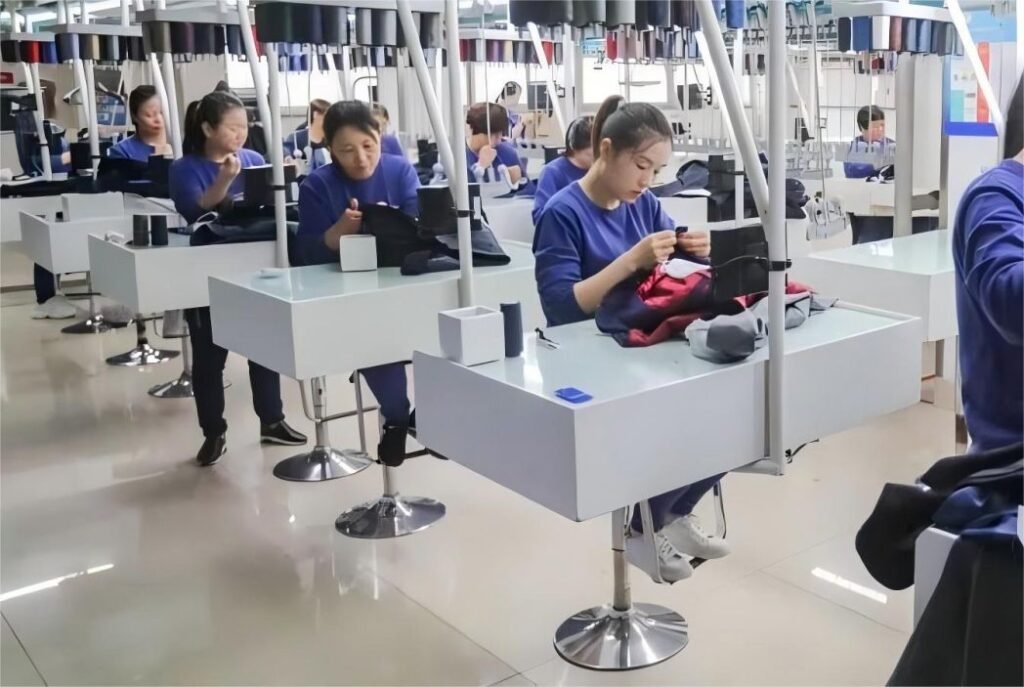No products in the cart.
Custom Yoga Pants
High Quality Clothing Manufacturer: Reliable Production for Trendy Apparel
Introduction: High Quality Clothing Manufacturer
In the fast-paced world of fashion, finding a high quality clothing manufacturer is crucial for brands looking to produce trendy and stylish apparel. A reliable production process is essential to meet the demands of the fashion industry and ensure that consumers receive top-notch products. From using high quality materials to implementing cutting-edge technology, a clothing manufacturer must have a skilled workforce and stringent quality control measures to deliver flawless products. Additionally, sustainable practices and a collaborative design process are key factors in creating unique and environmentally-friendly apparel. Timely delivery and customer satisfaction are also vital for building trust and loyalty with clients. In this article, we will explore the importance of reliable production in the fashion industry and how it contributes to the success of high quality clothing manufacturers.

The Importance of Reliable Production in the Fashion Industry
Reliable production is the backbone of the fashion industry. It ensures that clothing manufacturers can meet the ever-changing demands of consumers and deliver products that are both trendy and of high quality. In an industry where trends come and go, it is crucial for manufacturers to have a production process that is efficient and adaptable. This allows them to quickly respond to market demands and produce apparel that is in line with the latest fashion trends.
Trends in Apparel Manufacturing: Meeting Consumer Demands
Consumer demands play a significant role in shaping the trends in apparel manufacturing. Today’s consumers are more conscious about the quality and sustainability of the products they purchase. They seek trendy apparel that not only looks good but also aligns with their values. This shift in consumer behavior has led clothing manufacturers to focus on producing garments that are not only fashionable but also ethically made. Reliable production processes enable manufacturers to meet these demands by using sustainable materials and implementing eco-friendly practices.
The Role of High Quality Materials in Trendy Apparel
High quality materials are essential for producing trendy apparel that stands out in the market. Clothing manufacturers must source materials that are durable, comfortable, and visually appealing. By using premium fabrics and materials, manufacturers can create garments that not only look good but also last longer. This not only satisfies consumers but also reduces the environmental impact of the fashion industry by promoting longevity and reducing waste.
Cutting-edge Technology: Enhancing Production Efficiency
In today’s digital age, cutting-edge technology plays a crucial role in enhancing production efficiency for clothing manufacturers. Advanced machinery and software enable manufacturers to streamline their production processes, reduce errors, and increase productivity. For example, computer-aided design (CAD) software allows designers to create and modify patterns digitally, saving time and resources. Automated cutting machines ensure precise and efficient fabric cutting, reducing material waste. By embracing technology, clothing manufacturers can produce trendy apparel more efficiently and effectively.
Skilled Workforce: The Backbone of Reliable Clothing Manufacturing
A skilled workforce is the backbone of reliable clothing manufacturing. From designers to pattern makers, seamstresses to quality control inspectors, each role requires expertise and attention to detail. Skilled workers ensure that the production process runs smoothly and that the final products meet the highest standards. Training and continuous education are essential to keep the workforce up-to-date with the latest techniques and trends in the industry. By investing in their employees, clothing manufacturers can maintain a high level of reliability in their production processes.

Quality Control Measures: Ensuring Flawless Products
Quality control measures are crucial for ensuring that clothing manufacturers deliver flawless products to their customers. From the moment the fabric is received to the final inspection before packaging, every step of the production process must be closely monitored. Quality control inspectors check for any defects, inconsistencies, or imperfections in the garments. This ensures that only products of the highest quality reach the market. By implementing stringent quality control measures, clothing manufacturers can build a reputation for reliability and excellence.
Sustainable Practices: A Priority for High Quality Clothing Manufacturers
Sustainability has become a top priority for high quality clothing manufacturers. The fashion industry is known for its negative environmental impact, from excessive water usage to chemical pollution. To address these issues, clothing manufacturers are adopting sustainable practices throughout their production processes. This includes using organic and recycled materials, reducing waste through efficient production methods, and implementing eco-friendly dyeing and finishing techniques. By prioritizing sustainability, clothing manufacturers not only contribute to a greener future but also attract environmentally-conscious consumers.
Collaborative Design Process: Creating Trendy and Unique Apparel
A collaborative design process is essential for creating trendy and unique apparel. Clothing manufacturers work closely with designers to bring their creative visions to life. By collaborating from the initial concept to the final product, manufacturers can ensure that the garments meet the latest fashion trends and consumer preferences. This collaborative approach allows for innovation and experimentation, resulting in apparel that stands out in the market. By fostering a strong partnership between designers and manufacturers, brands can produce trendy and unique apparel that resonates with consumers.
Timely Delivery: Meeting Deadlines in the Fashion Industry
Timely delivery is crucial in the fast-paced fashion industry. Brands rely on clothing manufacturers to deliver their products on time to meet market demands and consumer expectations. Delays in production can result in missed opportunities and loss of revenue. Reliable clothing manufacturers have efficient production processes in place to ensure that deadlines are met. This includes effective planning, streamlined workflows, and clear communication between all parties involved. By prioritizing timely delivery, clothing manufacturers build trust and loyalty with their clients.
Customer Satisfaction: Building Trust with Reliable Production
Customer satisfaction is the ultimate goal for clothing manufacturers. Reliable production processes contribute to customer satisfaction by delivering high quality products that meet or exceed expectations. When consumers receive trendy and well-made apparel, they are more likely to become repeat customers and recommend the brand to others. Reliable production also ensures consistency in product quality, which is crucial for building trust and loyalty with customers. By consistently delivering on their promises, clothing manufacturers can establish a strong reputation and gain a competitive edge in the market.

Conclusion: Choosing a High Quality Clothing Manufacturer
In the competitive world of fashion, choosing a high quality clothing manufacturer is essential for brands looking to produce trendy and stylish apparel. Reliable production processes are the foundation of successful clothing manufacturing. From using high quality materials to implementing cutting-edge technology, a clothing manufacturer must have a skilled workforce and stringent quality control measures to deliver flawless products. Sustainable practices and a collaborative design process are also key factors in creating unique and environmentally-friendly apparel. Timely delivery and customer satisfaction are vital for building trust and loyalty with clients. By choosing a high quality clothing manufacturer that prioritizes reliable production, brands can ensure that their products meet the demands of the fashion industry and exceed consumer expectations.
